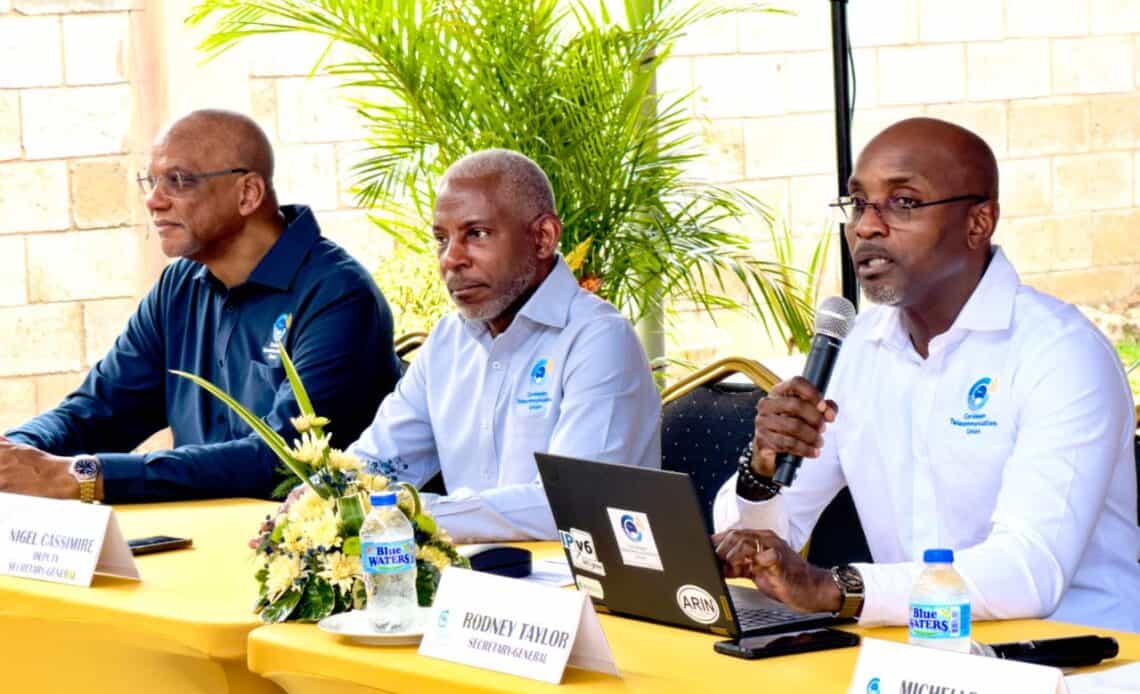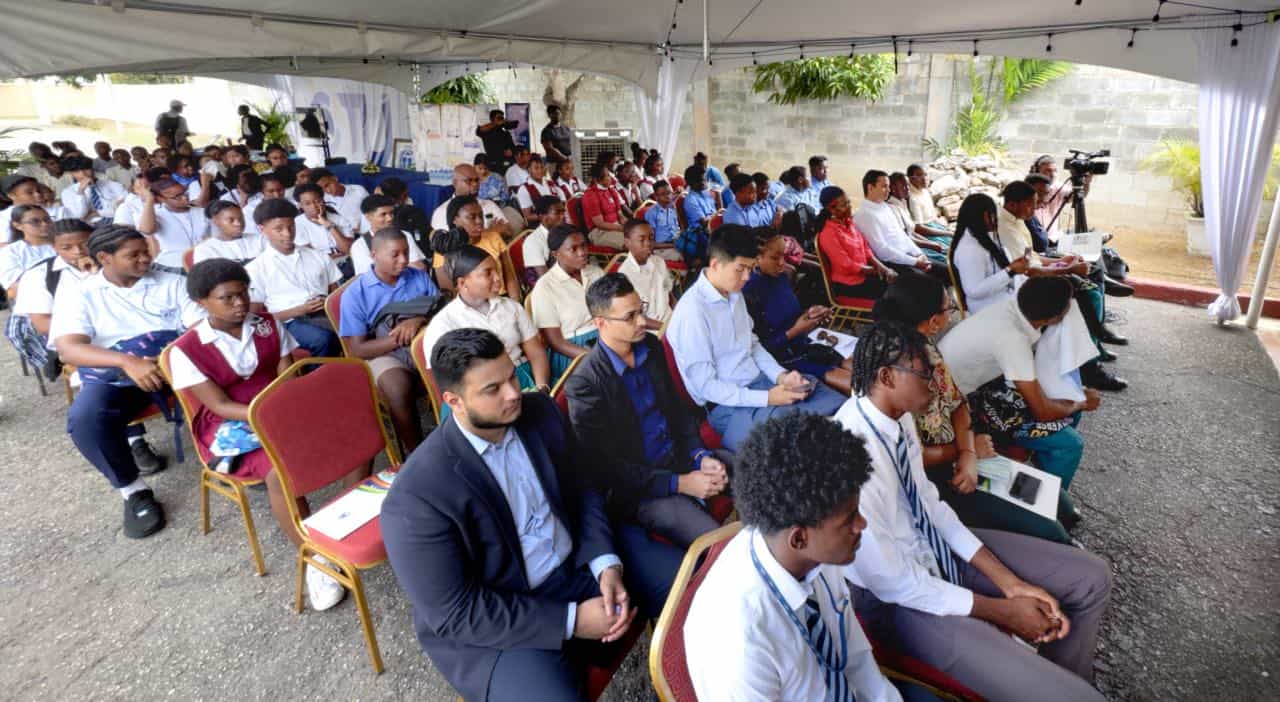
Above: The CTU’s Trevor Prevatt, Nigel Cassimire and Rodney Taylor at the launch event. Photo by Mark Lyndersay.
On May 01, 2024, Secretary General of the Caribbean Telecommunications Union Rodney Taylor opened the week’s anniversary celebrations with this speech to the media, invited guests and secondary school studentsat an event in St Clair, Port of Spain.
In 1989 when the CTU was established by CARICOM Heads of Government, the telecommunications landscape in the Caribbean was undergoing significant changes. There was monopoly and limited competition, Many Caribbean countries had telecommunications services were dominated by state-owned monopolies or a limited number of providers.
This lack of competition often resulted in high prices, limited service offerings, and slow innovation in telecommunications technology.
The focus during this period was primarily on basic voice communication, including landline telephony and international calling services. Networks were largely based on traditional copper wire infrastructure for fixed-line services.
Access to advanced telecommunications technologies, such as cellular/mobile networks, was limited and often concentrated in urban areas. Mobile phones were not yet widely available or affordable for the general population.
International connectivity and access to global telecommunications networks were often constrained, leading to limited international calling options and high costs for international communications.
Telecommunications services were heavily regulated by governments, with strict control over licensing, pricing, and service provision.
Regulatory frameworks often hindered innovation and investment in the telecommunications sector. Despite the challenges, there was a growing recognition of the importance of telecommunications and information and communications technology (ICT) for economic development.Governments and regional organizations began to explore policies and initiatives to modernize and expand telecommunications infrastructure.
Regional cooperation in telecommunications was starting to gain traction, with efforts to harmonize telecommunications policies and regulations among Caribbean countries. Organizations that emerged out of this environment, such as the CTU), played a pivotal role in promoting collaboration and coordination in the telecommunications sector.
Comparing the telecommunications landscape in the Caribbean from 1989 to today reveals a remarkable evolution driven by technological advancements, regulatory reforms, market liberalization, and increased investment.
Today, the market offers a wide range of services beyond basic voice communication, including mobile and internet services, data connectivity, digital TV, and value-added services like mobile banking and e-commerce.
The proliferation of mobile technology has transformed communications in the Caribbean. Mobile penetration rates are now high, with many Caribbean countries having more mobile subscriptions than their population size.
Mobile networks have expanded coverage to rural and remote areas, improving accessibility to telecommunications services.
Broadband internet access has become more widespread, with the deployment of fixed-line broadband networks and the expansion of mobile broadband (3G, 4G, and in some cases, 5G) services.
Internet speeds and reliability have improved, enabling greater adoption of online services, video streaming, cloud computing, and digital content consumption.
There is a growing focus on digital transformation and ICT development across the Caribbean region, driven by government initiatives and private sector investments.Initiatives such as e-government services, digital literacy programs, and smart city projects are aimed at leveraging ICT to drive economic growth, improve governance, and enhance quality of life.
The region is now more integrated into global telecommunications networks, facilitating international business, tourism, and communication.
Regional organizations like the CTU continue to play a vital role in promoting collaboration, harmonization of policies, and sharing best practices among Caribbean countries.
Efforts towards regional integration in telecommunications aim to create a unified digital market and enhance interoperability of ICT services across borders.
Overall, the telecommunications landscape in the Caribbean has undergone a profound transformation over the past few decades, moving from a state-dominated, monopolistic model to a more competitive, diversified, and technologically advanced environment. While challenges such as digital divide, cybersecurity threats, and infrastructure gaps remain, the region is poised for continued growth and innovation in telecommunications and ICT, driving socioeconomic development and connectivity for its citizens.
The CTU can not take all of the credit for the transformation of the regional ICT landscape. Much of the changes in fact were driven by technological advancements and innovation in the industry. Today, for example, our regional operators will cite the dominance of over the top or OTT services that provide streaming services, instant messaging, and social media services as providing with the greatest challenges in terms of network capacity and the viability of their investments in their networks.
This has signalled the death of traditional voices calls and the corresponding revenue over the last 20 years. They are calling for regulatory intervention and so are many other countries in the world. The CTU has been facilitating discussions on these issues for some time.
It is one of our commitments coming on the heels of the Declaration of St. George’s, signed on February 23, 2022, in Grenada aimed at reducing roaming charges within the Caribbean Community (CARICOM). The declaration has successfully made mobile services, such as voice, SMS, and data, more accessible and affordable for CARICOM residents. Regional operators committed to the reduction of roaming charges by up to 90% making them more predictable and transparent.
There is still work to be done in this area as the agreement fell short of the call by regional Heads of Government for total and complete elimination of roaming charges within CARICOM, the so-called “roam like at home”. We will get there but there is more
hard work to be done. They say nothing good comes easy.
We are now very focused, with the support of partners like the International Telecommunication Union (ITU) and the Commonwealth Secretariat on the creation of a more harmonised ICT Regulatory Framework within CARICOM. We already work very closely with national and regional regulators on issues of spectrum harmonization and annually convene a meeting of regulators within our signature annual event the CTU ICT Week, the next one taking place in St. Kitts and Nevis in September of this year.
We will continue to represent the interest of our region in international ICT policy development processes, especially in areas that address the regional and national connectivity gaps, critical internet infrastructure and resources, digital skills, cybersecurity, new and emerging technologies such as artificial intelligence, autonomous systems, new satellite systems and next generation technologies such as 5 and 6 G.
We will continue to build partnerships from every corner of the world and from every stakeholder group, private sector, public sector, civil society, the technical community and academia. We will navigate, as best we can, the geo-politics of the global technological landscape and continue to work in the interest of our regional governments and ultimately the citizens of the Caribbean.
If you believe in the idea of CARICOM, and I hope you do, and if you believe that we are stronger if we work collectively, and I hope you do, if you believe that the CARICOM Single Market and Economy is a worthy objective, and I hope you do, then I ask you today to believe in and support the work of the CTU as we celebrate 35 years of technological innovation and leadership.



[…] Caribbean – On May 01, 2024, Secretary General of the Caribbean Telecommunications Union Rodney Taylor opened the week’s anniversary celebrations with this speech to the media, invited guests and secondary school students at an event in St Clair, Port of Spain… more […]